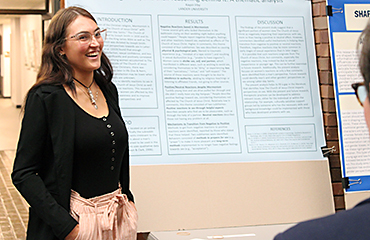
Lander University’s students put on an impressive display of the wide range of research they have done this year at the annual academic symposium last week.
The annual symposium gave students a chance to present research through roundtable discussions, classroom presentations and a poster session.
Dr. Lillian Craton, professor of English and director of the Honors College said the academic symposium is one of her favorite traditions at Lander.
“That is because this is a chance for our students all the way from freshman year up to senior year to take their work up a level,” she said. “It’s a chance for our first year students to see the way they’re going to be writing and talking and researching by the time that they graduate, it’s a chance for our seniors to feel like they get to be the center of attention, that the faculty are listening to them instead of the other way around and it is a chance for all of our students to practice their professional communication skills, to practice their planning and organization skills. There’s just so many different ways in which this pays off for our students.”
The symposium, Craton said, is a chance to get out of the classroom and celebrate what others get excited about.
Topics at the symposium stretched across the various academic fields at Lander.
Senior visual arts student Kristina Peay gave a presentation about how she mixed ceramics and chemistry when experimenting with glazes. Bryce LeCroy, a senior English major, presented on “How Vampires Became Goblins,” comparing Bram Stoker’s “Dracula” to Christina Rossetti’s “Goblin Market.” Jaziah Eaddy, a senior criminology student, presented about her time volunteering in a prison through a Lander course.
They were just a few among many who presented over multiple days.
The academic symposium ended with a poster session where dozens of students had the chance to show off and speak about their work.
Cristyn Reynolds is a senior interdisciplinary studies major from Chester who looked at the long-term effects of bullying and studied what interventions and programs could be implemented to help students who have been bullied.
“Just trying to bring awareness to whatever we want to speak about, having a voice is very important when you are in college and you don’t really have a voice, so this is a great way to get yourself out,” she said about the symposium.
There’s an added benefit, she said, in that doing this sort of research means she will have resources at hand when she goes into her career in education.
Click here to view the presentations from all of the participants.